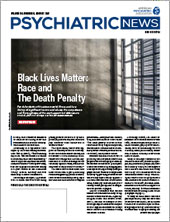When Charles Raison, M.D., a professor of psychiatry and the Mary Sue and Mike Shannon Chair for Healthy Minds, Children & Families at the University of Wisconsin-Madison joined the scientific board at the nonprofit Usona Institute in 2015, he was stepping into uncharted territory.
At the time, Usona was one of only a few nonprofits in the United States studying psychedelics. Today, the psychedelic medicine industry is believed to be an investment opportunity worth $100 billion. But will psychedelic medicine live up to the hope it has generated these past few years? Raison and other experts discussed this question in a session exploring the role of psychedelics in psychiatry at APA’s 2021 online Annual Meeting in May.
Also speaking during the session was Michael Mithoefer, M.D., the senior medical director for medical affairs, training, and supervision for the nonprofit Multidisciplinary Association for Psychedelic Studies (MAPS). He presented promising results from the first completed phase 3 clinical study involving a psychedelic substance. The trial involved 90 adults with chronic posttraumatic stress disorder (PTSD) who received three supportive psychotherapy sessions after taking either MDMA (3,4-methylenedioxymethamphetamine) or placebo. (MDMA has been a controlled substance since 1985, but in 2017 the Food and Drug Administration [FDA] granted Breakthrough Therapy designation to MDMA-assisted psychotherapy for the treatment of PTSD. This designation helps to expedite the development and review of drugs that are intended to treat a serious condition.)
Overall scores on the Clinician-Administered PTSD Scale for DSM-5 (CAPS-5) dropped by almost 25 points among participants who took MDMA before psychotherapy compared with 14 points among those who took placebo before therapy. MDMA was also well-tolerated, with muscle tightness and decreased appetite being the most common side effects. Importantly, MDMA was not associated with any increases in suicidal ideation or any indication of potential for abuse.
Mithoefer said that he was extremely encouraged by the robust findings, given that the participants had severe PTSD symptoms, and many had comorbid depression and high suicidal ideation. A second phase 3 trial is underway in sites across Europe and the United States, and if the results are similar, he said MAPS could submit an approval application for MDMA to the FDA by the end of 2022.
The MDMA trial was not the only promising data presented during the session. Stephen Ross, M.D., an associate professor of psychiatry at NYU Langone Health, discussed his recent findings on the long-term effects of psilocybin-assisted psychotherapy for treating cancer patients with depression. Like MDMA, psilocybin is a controlled substance that received the FDA Breakthrough Therapy designation, thanks to the clinical work of Ross and others. A study published by Ross and colleagues in 2016 showed that a single session of psilocybin-assisted psychotherapy led to rapid improvements among late-stage cancer patients with depression, anxiety, and feelings of hopelessness. Just last year, Ross completed a long-term follow-up study and found that over 60% of the participants still alive 4.5 years later who received psilocybin continued to show an antidepressant response.
“Cancer-related depression and PTSD are similar in that both are defined by a precipitating event,” Raison explained. “These drugs [the psychedelics] assist people in facing that experience and no longer avoiding it.” What is less clear is whether psychedelics can help patients with such conditions as substance use disorders and major depression not tied to a precipitating event.
During the session, Ross pointed to the New England Journal of Medicine study published in April that revealed that adults with a long history of depression who took psilocybin experienced similar reductions in depressive symptoms over six weeks as those taking escitalopram. These patients also experienced a similar incidence of adverse side effects.
While he was optimistic that the study demonstrated that a psychedelic substance can be as effective as an FDA-approved antidepressant, he noted at the same time that psilocybin did not offer any advantage or unique improvements. “This outcome did throw a dose of cold water on the exuberance in our field; we are in an exciting time but it’s important to remember [the] history [of psychedelics being misused] and proceed cautiously,” he said.
Raison also questioned how psychedelics could be used in any long-term capacity. Most clinical studies provide only one or a few doses during psychotherapy sessions, under the theory that psychedelics promote long-term improvements. Outside of Ross’s recent findings, there are very few data on whether the effects persist for more than a few months.
“For example, we don’t know whether psychedelics are prone to tachyphylaxis [diminishing responses to repeated doses of a drug],” he said. “People might agree to a psychedelic dose once every six months, but then what happens if someone with depression crashes after just three months?”
Raison said that with these dosing unknowns and the resources required for psychedelic-assisted psychotherapy (see box), psychedelics may be best suited for limited use in patients with severe illness to jump start the therapeutic process. After a few psychedelic-assisted sessions, the hope is that patients could be switched to a standard oral antidepressant to keep them stable. ■

